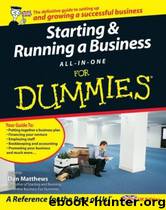Starting & running a business all-in-one for dummies by Dan Matthews

Author:Dan Matthews [Matthews, Dan]
Language: eng
Format: epub
Tags: Business & Economics, New Business Enterprises, Industrial Management
ISBN: 9780470516485
Publisher: Wiley
Published: 2007-09-14T04:00:00+00:00
Book IV
Paying on Account
How Not
to Cook
the Books
The self assessment tax system works with two formal payment dates a year.
On 31 January you have to pay anything still outstanding from the tax year which ended on the previous 5 April, plus half your likely tax bill for the year which will end on the forthcoming 5 April. So on or before 31 January 2008
27_516485 bk04ch02.qxp 8/14/07 10:58 AM Page 320
320 Book IV: How Not to Cook the Books
you should have paid any outstanding balances for 2006–07 plus half of what you are likely to owe in 2007–08.
You do not have to make payments on account if 80 per cent or more of your income tax bill (but not capital gains tax) is covered by tax deducted at source – PAYE and automatic deductions from savings interest are common deductions. It’s up to you to work this out. It is best to ignore this concession if you are a ‘borderline’ 80 per cent case.
There is no interest benefit if your payment arrives early (but at least you know you’ve done it and won’t get penalised!)
Asking for a reduction in payments
If your tax liability for this year is likely to be significantly lower than the previous year, you can ask for a reduction in your payments on account.
Otherwise, you could end up paying more than you need until it is corrected in the following year’s tax return.
You can claim a reduction on your payments on account on a tax return, or by writing to HMRC. You must give valid reasons to back your claim. HMRC
adds interest to your repayment, but the rate is far lower than the interest they charge you if you owe them money.
Adding up the potential penalties
You face an automatic £100 penalty if you fail to get your return in by 31
January. And there is a further £100 if you have still not filed by the following 31 July. In addition, there is a 5 per cent surcharge on tax unpaid on 28
February, and a further 5 per cent if it is still unpaid (plus interest on the first surcharge). This is a painful sum!
Penalties cannot be greater than the tax owed. If you discover you owe nothing or are due a rebate, the 31 January deadline does not apply.
Some people who cannot fill in their form properly make an estimate and then pay over more tax than needed. If you pay more than you owe, you cannot be fined. You can claim any excess back later.
Download
This site does not store any files on its server. We only index and link to content provided by other sites. Please contact the content providers to delete copyright contents if any and email us, we'll remove relevant links or contents immediately.
Professional Troublemaker by Luvvie Ajayi Jones(29640)
Whiskey Words & a Shovel I by r.h. Sin(19363)
Rewire Your Anxious Brain by Catherine M. Pittman(18617)
Healthy Aging For Dummies by Brent Agin & Sharon Perkins RN(17028)
Cat's cradle by Kurt Vonnegut(15293)
Talking to Strangers by Malcolm Gladwell(13327)
The Art of Thinking Clearly by Rolf Dobelli(10376)
They Both Die at the End by Adam Silvera(9788)
The 5 Love Languages: The Secret to Love That Lasts by Gary Chapman(9754)
Doing It: Let's Talk About Sex... by Hannah Witton(9265)
The Compound Effect by Darren Hardy(8901)
Thirteen Reasons Why by Jay Asher(8870)
Goodbye, Things by Fumio Sasaki(8559)
Wonder by R.J. Palacio(8548)
Tools of Titans by Timothy Ferriss(8345)
Atomic Habits: Tiny Changes, Remarkable Results by James Clear(8304)
Becoming Supernatural by Dr. Joe Dispenza(8183)
Wonder by R. J. Palacio(8084)
Change Your Questions, Change Your Life by Marilee Adams(7715)
